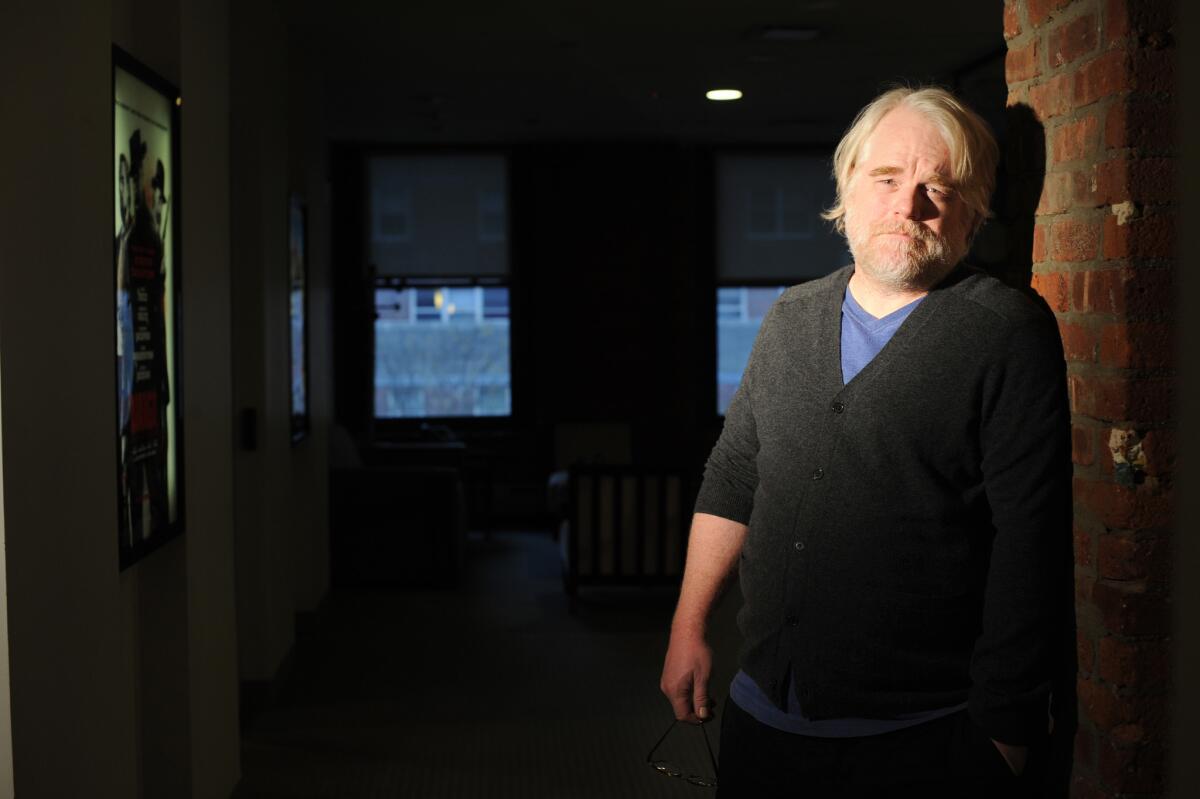Philip Seymour Hoffman dies at 46; Oscar-winning actor

Philip Seymour Hoffman
Academy Award winner Philip Seymour Hoffman, one of the most acclaimed character actors and ambitious performers of his generation, was found dead of an apparent drug overdose inside his New York apartment on Sunday, police said. He was 46.
A business associate discovered Hoffman in his bathroom with a needle stuck in his left forearm at about 11:30 a.m. Eastern Standard Time, police said. Two glassine envelopes containing what was thought to be heroin were near his body, and five empty envelopes were found in the trash, police said. The city medical examiner has not yet determined a cause of death.
Hoffman rose to fame through his pinpoint-precise movie portrayals of oddballs, schemers and misfits, often physically transforming himself for the roles. He won an Oscar portraying author Truman Capote in the 2005 biopic “Capote.”
PHOTOS: Philip Seymour Hoffman | 1967-2014
A bear-like, perennially rumpled presence known as an actor’s actor, Hoffman displayed considerable range during a career that spanned more than 20 years and nearly 60 films. He worked with top directors — including, repeatedly, the Coen brothers, Paul Thomas Anderson and Bennett Miller — and appeared opposite a constellation of Hollywood’s biggest stars. The work brought him four Academy Award nominations, three Tony nominations and an Emmy nod, not to mention critics association accolades.
“He gave performances of sacred and terrifying intensity,” said noted stage director Peter Sellars, who worked with Hoffman in productions of Shakespeare’s “Othello” and “The Merchant of Venice.” “Phil burned so brightly and with such unrelenting love — it made him one of the great theater performers of his or any generation.”
Despite his command of the dramatic arts and work ethic, the protean actor — a father to three young children — battled with long-term addiction. He publicly acknowledged that he had undergone treatment for substance abuse problems.
PHOTOS: Notable deaths of 2014
“Anything I could get my hands on,” Hoffman said of his drug and alcohol dependency on “60 Minutes” in 2006. “I liked it all.”
The versatile actor, who starred in such films as “The Master,” “The Hunger Games: Catching Fire,” “Charlie Wilson’s War” and “Boogie Nights,” reportedly checked himself into rehab last year for 10 days after relapsing in 2012.
Famously self-effacing, Hoffman gave little public indication he was wrestling with his demons, recently attaching his name to a string of high-profile movies and television projects.
Just last month, Hoffman traveled to the Sundance Film Festival in Utah to promote the drama “A Most Wanted Man,” set for release this year, in which he portrays a grizzled counter-terrorism operative.
“We spent some time together only two weeks ago and he seemed in a good place despite some issue he had to deal with,” said Anton Corbijn, director of “A Most Wanted Man,” without elaborating further.
Hoffman served as an executive producer and was set to star in the upcoming Showtime comedy “Happyish,” for which a pilot had been filmed and 10 episodes were being written.
Hoffman also was scheduled to direct the Prohibition-era drama “Ezekiel Moss” starring Amy Adams and Jake Gyllenhaal.
PHOTOS: Celebrities react to Hoffman’s death
Hoffman appeared in a supporting role in last year’s “The Hunger Games: Catching Fire,” which grossed $860 million worldwide and stands out as the most commercially successful movie of his career. He had filmed scenes for two sequels in the blockbuster franchise, which are still in production.
His work was “substantially complete” on “The Hunger Games: Mockingjay — Part I” and he had seven shooting days remaining on “Mockingjay — Part 2,” according to a person close to the films who was not authorized to talk to the media. The actor’s death will not affect the films’ scheduled release in November 2014 and 2015, the person said.
“Philip Seymour Hoffman was a singular talent and one of the most gifted actors of our generation,” Lionsgate, the studio behind the “Hunger Games” films, said in a statement. “We’re very fortunate that he graced our Hunger Games family. Losing him in his prime is a tragedy, and we send our deepest condolences to Philip’s family.”
Hoffman is survived by his children Tallulah, 7; Willa, 5; and Cooper, 10, and his longtime partner, Mimi O’Donnell, artistic director of New York’s Labyrinth Theater Company.
“We are devastated by the loss of our beloved Phil and appreciate the outpouring of love and support we have received from everyone,” Hoffman’s family said in a statement. “Please keep Phil in your thoughts and prayers.”
PHOTOS: Hoffman’s memorable roles
On Sunday evening, the area surrounding Hoffman’s Bethune Street apartment building in lower Manhattan remained cordoned off by crime scene investigators and medical examiners. Hoffman’s body was wheeled out of the building at 6:45 p.m. EST and driven away in a medical examiner’s van. As soon as police opened the street to the public, mourners began to leave flowers on the stoop.
“I felt like a magnet was dragging me down here,” said Holly Kenny, 53, of Fairlee, Vt., who was at a trade show when she heard about the actor’s death and arrived on scene clutching a bouquet of white flowers.
Hoffman was raised in a middle-class household in Rochester, N.Y., by his mother, a civil rights activist turned judge. He showed early promise in wrestling and baseball until a neck injury derailed his athletic career.
He began acting at age 15 and studied theater at New York University, graduating in 1989. Soon afterward, at 22, the actor checked himself into a rehabilitation program for alcohol and drug addiction.
“I had no interest in drinking in moderation. And I still don’t,” Hoffman told the British newspaper the Guardian in 2011. “Just because all that time’s passed doesn’t mean maybe it was just a phase. That’s, you know, who I am.”
PHOTOS: Celebrities react to Hoffman’s death
Indelibly, Hoffman embodied Capote, the “In Cold Blood” author, as a lisping narcissist. He brought stunning specificity to a variety of roles, playing a messianic cult leader in his turn in “The Master” (2012), a mouth-breathing sycophant in “Boogie Nights” (1997), a Machiavellian political consigliere in “The Ides of March” (2011), a kind-eyed nurse in “Magnolia” (1999) and a maverick CIA operative in “Charlie Wilson’s War” (2007). He received supporting actor Academy Award nominations for his work in both “The Master” and “Charlie Wilson’s War,” as well as for his role in “Doubt.”
“It’s amazing that this is my life as an actor,” Hoffman told The Times last year. “Twenty years ago, I would never have said this would be my life. I don’t think anyone would. I’m a very lucky man.”
Hoffman was nominated for an Emmy for his performance in the 2005 HBO miniseries “Empire Falls.” A journeyman stage actor, he had served as artistic director of Labyrinth Theater Company and was nominated for three Tony Awards, including one for his 2012 portrayal of Willy Loman in the Broadway revival of “Death of a Salesman.”
Robert Falls, artistic director of the Goodman Theatre in Chicago, directed Hoffman in a production of “Long Day’s Journey Into Night” in which the actor portrayed an addict. Falls recalled Hoffman’s ability to channel real-life experience into his performance.
“He was well acquainted with the tragic pull that drugs have,” Falls said. “In the rehearsal room, there was a cost. Phil couldn’t fake it. He lived through it.”
Public figures ranging from New York Mayor Bill de Blasio to Chelsea Clinton to Judy Blume took to Twitter on Sunday to register their shock and grief. Talk show host Ellen DeGeneres hailed Hoffman as a “brilliant, talented man,” and “Girls” creator Lena Dunham observed, “We have lost so much joy to something so joyless. RIP PSH.”
Times staff writers Meredith Blake and Tina Susman contributed from New York, and staff writers Amy Kaufman, David Ng and Yvonne Villarreal contributed from Los Angeles.
More to Read
Only good movies
Get the Indie Focus newsletter, Mark Olsen's weekly guide to the world of cinema.
You may occasionally receive promotional content from the Los Angeles Times.











